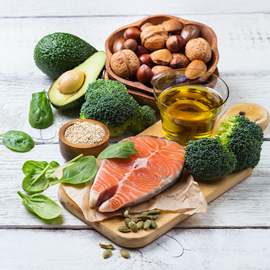25
Jul
Understanding FAT and Weight Loss
 Thanks to the way that the word “fat” is thrown around to talk about obesity, many people are surprised to learn that there are actually good fats in the world, and that to eat a healthy diet that benefits your heart you actually need to make sure that you are eating those good fats every day.
Thanks to the way that the word “fat” is thrown around to talk about obesity, many people are surprised to learn that there are actually good fats in the world, and that to eat a healthy diet that benefits your heart you actually need to make sure that you are eating those good fats every day.
Even during your weight loss program, you need to make sure that you are eating enough fat to stay healthy. Your weight loss surgeon will explain exactly what types of fats you need, how much of each type you ought to be eating every day, and where you can find those fats naturally in your diet.
Here is a quick break down of the different types of fat that you are encountering daily in your diet:
Saturated Fats
Saturated fats are the unhealthy fats. From a chemical perspective, these fats are different from other types of fats thanks to the fact that they lack a double bond between molecules. What does that mean in standard terms? These fats are solid at room temperature and they don’t break down very easily. This is the type of fat that builds up in your body (hence the name, saturated). Saturated fats are the types of fats that you will find in meats and baked goods.
Unsaturated Fats
Unsaturated fats are the healthy fats, and there are actually two different types of unsaturated fats that you ought to be on the lookout for. These fats have at least one double bond present between molecules, making the fats able to bend and move with more ease. The body relies on unsaturated fats in your diet to support fundamental functions, including heart health and brain development. There are two types of unsaturated fats: polyunsaturated and monounsaturated. Both can be found in nuts and seeds, as well as certain oils and vegetables. Foods like olive oil, avocado, and nut butters are all sources of unsaturated fats.
Trans Fats
This last category of fats is another bad fat. Trans fats are fats that are created in the cooking or processing of your meal through a process called hydrogenation. Too much of this type of fat is very bad for your heart health, in particular.
The more you know about fats, the better off you’ll be when it comes to making the healthiest choices possible for your dietary needs. Talk with your weight loss surgeon about what types of fats and how much fat you should be eating regularly before making any changes to your diet.




Understanding FAT and Weight Loss